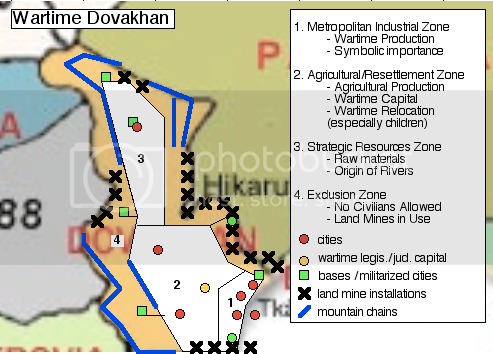EXECUTIVE NOTICE
Office of the Khagan-Chancellor
Effective immediately, wartime measures approved by the Cama and signed by the Khagan-Chancellor dictate a full-scale evacuation of the border regions of Dovakhan. These areas will be converted into fully militarized exclusion zones where the Dovakhanese Armies of the Air and Land can operate to protect the population core of Dovakhan and its strategic natural resources. Evacuation in affected cities will be orchestrated by the Civilian Corps of the Dovakhanese Department of Defence.

Those evacuated will be conveyed in an orderly manner to host towns in the centre-south of the country. This Resettlement Zone will also be the site of the wartime legislative and judicial capitals at Vîn. The executive will remain in Tkânâtdövâkhîastâât along with most executive departments. The urban core of Dovakhan located along the coast will be the site of major industrial production by temporarily-nationalized wartime industries. Also, a census of reservists and current conscripts in the Dovakhanese Militia will be taken pending the implementation of a full-scale conscription by the Cama.
This is the hour of reckoning for our Dovakhanese motherland. The speedy and efficient implementation of these measures is essential for the preservation thereof.
Thank you for your cooperation and continued support,
Ânâtöl Êfösêbâd
Khagan-Chancellor
Jölîêt Drâpö
Speaker of the Cama
Leader, Dovakhanese Republican Alliance
Strâs Âlmât 221, Bêzîrk 2, Âmnäptê
Zhov Khanate, Dovakhan
The largest city in the exclusion zone was Âmnäptê, a large mining town on the border with Packilvania. The mass evacuation there began the day following the Khagan-Chancellor’s address. the plan was to relocate the families there to the safer interior and use the city as a military outpost in the remilitarized border zone.
One of the thousands of families participating in one of the largest internal migrations in Dovakhanese history was the family of Ênrîk Sôlhâm. Ênrîk was a miner and his wife, Ânâ Gêlmât, a schoolteacher. They had two children, Âlvâs Gêlmât and Lârâ Sôldhâm and lived in a modest but well-appointed rowhouse in the city’s Second Ward.
The call for evacuation came suddenly, but not necessarily as a surprise, for Ênrîk and Ânâ were one the first to complete their training in the Dovakhanese Militia following its creation after the Third Continental War. Indeed, the notice of evacuation immediately . Over the next two days, the family packed their most precious belongings to the exact per capita weight allowed on the special evacuation trains. Then, on Evacuation Day, the family proceeded to the Second Ward Community Center for the muster. As they left, Ênrîk spray-painted an “X” on the door with the date, the ward, the number of adults, and the number of children:
23.08.18
2 X 2
2
Sêfûnîûm Bêzîrk 2
Âmnäptê, Zhöv, Dövâkhân
The Second Ward Community Center was packed with similar families reporting for the muster. Tables of Civilian Corps volunteers used a various government directories to record families that had come for the muster and check for possible draftees. The Gêlmât-Sôldhâm family approached one of the tables.
«Is this everyone from Strâs Âlmât 221?» asked a young woman at the table.
«Yes, thank you.» said Ênrîk as he handed over the family’s health cards to be checked against the several books that lay on the table.
«Ânâ Gêlmât (38 years old) and Ênrîk Sôldhâm (36), you as well as your children, Âlvâs Gêlmât (13) and Lârâ Sôldhâm (10), are recorded» the woman said before she continued with, «Also, both of you owe 100 days of service each in the Dovakhanese Militia. That means that one of you is required to sign up for the conscription currently in place for reservists»
This was also not a surprise, since neither was old enough to exempt out of reserve duty nor had either served any time after their mandatory six months. To that effect, the couple had decided that Ênrîk would go, as Ânâ was to be drafted into civilian service as a wartime teacher.
«Record my name, please replied Ênrîk as he presented his conscription card.
The young women quietly took Ênrîk’s number down in the reservist list and made marks in their family page in the directory. After everything was in order, she handed by Ênrîk’s card and three green tickets she pulled out of a metal box.
«The three of you that are evacuating are to gather your vital records and personal documents, report to Central Train Station by 18:00, and board the colour-coded train indicated on the ticket. This train will take you to a small town in rural Bövîâ called Tûrzît where host families have volunteered to take refugees. This is your designated place of relocation, but you may make alternate arrangements from there.
As for you, Sôldhâm, you are asked to remain in town, in your home if you wish. Military occupation of this city will begin at 8:00 tomorrow, at which time you are to present yourself here to be registered as a draftee. They will give you further instruction. Good luck and thank you for your service» the young woman said, finally giving Ênrîk a sympathetic smile.
The family left the community center at noon. The sun shone high in the sky on the last day for a very long time that everyone would be together. Their house emptied, the Gêlmât-Sôldhâm Family checked their bags at the station and had a picnic lunch, followed by a film and ice cream. Had one not known any better, one would see this as nothing more than a special Sunday with the family.
However, the feelings of separation began to sink in quickly, culminating in the sombre good-bye at the station. Ênrîk Sôldhâm lectured his two children about proper hygiene and good behavior as tears came to his eyes. He embraced them and his beloved wife in an unbreakable bind of passion. Finally, the whistle blew and they had to part, for how long no one knew.
